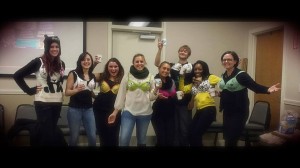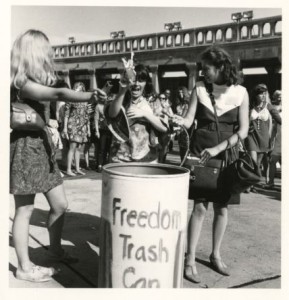Happy FemTechNet New Year!
September 18, 2015
Hello and welcome to the FemTechNet Year 3! It’s hard to believe that it was only in 2012 that Anne Balsamo and Alexandra Juhasz began bringing feminist scholars together to form FemTechNet, and that this September marks our third full season of running our Distributed Open Collaborative Course (DOCC) – this year offered again as “Collaborations in Feminism and Technology.” We have grown in numbers, projects, and community and our commitment to feminist technologies, including collaboration, care, and humor, have kept us all coming back! Last year co-facilitators Elizabeth Losh, Lisa Nakamura and Sharon Irish held our course steady and continued with the great foundational work of Anne and Alex. This year we have a team of five co-facilitators — the Feminist 5 #F5 — who will be working together and with the whole FemTechNet collective to help shape and sustain our work.
So, introducing the Feminist Five #F5:
- Anne Cong-Huyen
- T.L. Cowan
- Paula Gardner
- Veronica Paredes
- Jasmine Rault
In addition to a new team of co-facilitators, FemTechNet will be operating under a slightly shifted committee structure: this new structure reflects the work that is being done by our network and each committee welcomes new membership of feminist activists, artists, organizers, makers, hackers and scholars.
Committee Structure & Descriptions:
- The Steering Committee is the decision-making, oversight and imagination body for the network. At the Steering Committee, we discuss and resolve topics and plans that affect the whole network. The Steering Committee is also where we gather regularly as a large group to connect with each other and check in on how we’re doing and where we’re going.
- Starting in October, 2015, the Steering Committee will meet monthly on the First Friday of each month for two hours (which will include a 30min info session, a 30min social, and a 60min agenda-driven meeting). An open agenda will be posted (location TBA) and anyone involved, or who wants to be involved, with the work of FemTechNet is welcome and encouraged to attend and be part of the collective process.
- Each Steering Committee meeting will be 2 hours long:
- Time: noon-2:00 p.m. PT // 2:00-4:00 p.m. CT // 3:00-5:00 p.m. ET
- Dates: (First Friday Monthly) October 2; November 6; December 4; January 8 (second Friday); February 5; March 4; April 1; May 6; June 3
- The first 30 minutes will function as an Information session for folks who are new to the network and others who have questions about how to be involved, how to get a FemTechNet project off the ground, etc. These information sessions will be hosted by at least one co-facilitator.
- During the second 30 minutes we will host the FemTechNet Ultra Lounge (thanks to Lisa Nakamura for this name), which will be a FemTechNet Online Social – we’ll check in and catch up. Bring your beverage of choice!
- The last hour of the meeting will be agenda-driven and chaired by one of the co-facilitators. The agenda will be an open document, posted the week before the meeting. If you would like to add an item to the agenda or if you would like to have input on an agenda item but can’t make it to the meeting, please add your thoughts to the document
- All steering committee meetings will be held in FemTechNet Blue Jeans Meeting Room 1: please email femtechnetinquiriesATgmailDOTcom for the link*
- ** If you are unfamiliar with the Blue Jeans online meeting platform, please take a few minutes before your first meeting to go through Connecting to FemTechNet with Blue Jeans: https://docs.google.com/a/newschool.edu/document/d/1B4fxbiukGY3eGsE600w8dCnX4ju8T1kdJnWqzqVqUTY/edit?usp=sharing **
- The Community Engagement & WWW Committee builds relationships among institutions, organizations and individuals to expand FemTechNet beyond Canada and the US. This may include: offering “orientation”/get to know us sessions; presenting at consortial meetings, expanding the scope of our research activities and actions; outreach, recruitment and networking (especially encouraging DOCC teaching in new locations, and creating new collaborations with artists and activists). Plans for this year: offering “Meet Us!” orientation (live!) sessions; creating a “Meet us!” video with diverse FTN voices; outreach to community partners (advocacy & activist groups; art organizations); encouraging the development of new online town halls/teach-ins/art exhibitions/tech trainings, etc); outreach to new international participants (inviting teaching and action engagements)
- The Critical Race and Ethnic Studies Committee creates interdisciplinary conversations, curriculum, and workshops by developing materials and activities that address issues of racialization, ethnic and cultural formation, power and identity. Our focus is on intersections of digital media and ethnic studies. Anchored in the legacy of critical race and ethnic studies, we are community activists engaged in practice-based scholarship and cultural work. We aim to engage public audiences with accessible media, community outreach, and feminisms inside and outside of the academy.
- The Pedagogy Projects Committee (PedProCom) supports the various pedagogy projects of the network including the DOCC, our new Introduction to Online Safety & Risk activity; the Critical Race & Ethnic Studies Workbook; the Situated Knowledges Map; Keyword Videos; Town Hall Meetings; Online Pedagogy Workshops and any other teaching projects that you might want to initiate and work on. PedProCom works to mentor FemTechNet faculty, develop curricula, coordinate inter-institutional collaborations, and support community engaged learners. We are also a site of collaboration, whether for research-creation or to develop publishing projects on pedagogy related topics.
- PedProCom Working Groups: DOCC Instructors (if you are teaching a DOCC, you are in this group); FTN Wikipedia
- The Operations Committee facilitates the work of the network. The Committee shapes the virtual organization of FemTechNet’s socio-technical systems used to support FTN as a geographically distributed network that is accountable to differences of access along multiple vectors of power, including global location, race, class, gender, sex, and abilities that influence the network’s collaborative use of information and communication technologies. Specifically the committee manages FemTechNet Communications, Publicity, and Archiving. Currently, the Operations Committee is integrating Slack into the community’s workflow, it is also documenting the network’s uses of communication platforms throughout the collective’s history.
- Operations Working Group: The purpose of the Tech Praxis Working Group is to shape, study and improve the infrastructure of FTN and assemble documentation on the interoperability of platforms. Plans for this year include: writing projects including grant applications, technical reports, peer reviewed essays, book chapters, and blog posts focused primarily on research and documentation around FemTechNet’s prototypes in designing, using, and hacking distributed learning systems.
As the renamed Operations Committee and its working group Tech Praxis signal, this year FemTechNet will continue to experiment with various learning and communication platforms, bending and building tools to facilitate feminist collaborations between instructors, researchers, committee and network members alike. The Tech Praxis Working Group is preparing for broader use of the EdCast learning network in FemTechNet courses and communication, which includes plans to study this platform, documenting what it enables and disables for FemTechNet, and situating it as an object of research within the collective’s fields of digital feminist tech praxis and digital media learning, through reports, posts and publications.
We’re also aiming to prioritize the social justice work already being done within the network, and to welcome and invite engagement, participation and partnerships with even more individuals and organizations working at the intersections of trans feminist anti-racist queer disability decolonizing economic social justice and technology. While many (and certainly not all) people who have been involved in FemTechNet are economically and professionally located in the university/college systems, the network is oriented as much (or more) to alter- counter- and anti-institutional impulses, initiatives and potentialities that work beyond, against and sometimes simultaneously within the university. We hope to keep bringing in and bringing out our activist, revolutionary, transformational, hacker movement builders.
More about the 2015-2016 Co-Facilitators:
- Anne Cong-Huyen – Digital Scholar and Coordinator of Digital Liberal Arts Program at Whittier College (California); Co-founder of #transformDH, steering committee member of HASTAC, member of FemBot Collective.
- Co-facilitator’s Focus: Critical Race and Ethnic Studies Committee
- T.L. Cowan – Bicentennial Lecturer in Canadian Studies at the MacMillan Center for International and Area Studies and Digital Humanities Fellow at Yale University (2015-16) & FemTechNet Chair of Experimental Pedagogies in the School of Media Studies at The New School; Independent Performance Artist; collective author, “We Are FemTechNet” Manifesto
- Co-facilitator’s Focus: PedProCom; FemTechNet Roadshow Blog Series
- Paula Gardner– Asper Chair in Communications, Faculty of Communication Studies and Multimedia, McMaster University (Hamilton, Ontario); Senior Adjunct Professor, OCAD University (Toronto, Ontario); outgoing Chair Feminist Scholarship Division of International Communication Association, FemBot Collective Member
- Co-facilitator’s Focus: WWW activities, Summer School Development and Organization; Seek funds for FTN activities
- Veronica Paredes – Postdoctoral Research Associate at Department of Media and Cinema Studies at University of Illinois, Urbana-Champaign. FemBot Collective Member.
- Co-facilitator’s Focus: Tech Praxis Working Group; production guidance for new audio-visual materials
- Jasmine Rault – Assistant Professor of Culture & Media, Eugene Lang College, The New School; former chair, FemTechNet White Paper Committee; collective author, “We Are FemTechNet” Manifesto
- Co-facilitator’s Focus: Operations Committee; Social Justice Practice & Initiatives

